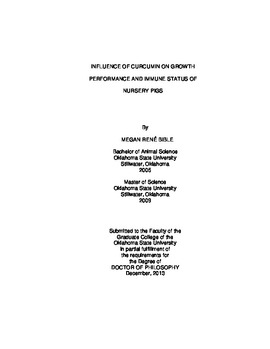| dc.contributor.advisor | Carter, Scott D. | |
| dc.contributor.author | Bible, Megan Rene | |
| dc.date.accessioned | 2015-06-17T20:04:55Z | |
| dc.date.available | 2015-06-17T20:04:55Z | |
| dc.date.issued | 2013-12 | |
| dc.identifier.uri | https://hdl.handle.net/11244/14731 | |
| dc.description.abstract | Five experiments were conducted to determine the effects of curcumin on growth performance and immune response of pigs. Experiment one evaluated the effects of increasing levels of turmeric on growth performance and immune response of nursery barrows. Increasing levels of turmeric powder quadratically increased final BW, ADG, and ADFI, and linearly increased G:F when compared to a control diet containing no antibiotics. Turmeric decreased the change in TNF-alpha; at h 3 PI (post-injection) compared to the control diet. The second experiment was to determine the effects of curcumin supplementation vs. carbadox on growth performance and immune status of nursery pigs. Pigs fed 46 mg/kg of curcumin had similar final BW, ADG, ADFI, and G:F as pigs fed 55 mg/kg of carbadox. Curcumin had the lowest change in TNF-alpha; at h 3 PI. Experiment three was a two-part study that examined the effects of increasing levels of curcumin on growth performance and immune status of nursery pigs. Pigs fed increasing levels of curcumin had similar growth performance when compared to pigs fed the antibiotic in study 1. Curcumin decreased the change in TNF-alpha; at h 3 PI. However, in study 2, pigs fed increasing levels of curcumin had decreased final BW, ADG, and G:F when compared with the antibiotic. Pigs fed curcumin had similar TNF-alpha; concentrations compared with pigs fed the antibiotic. Experiment four evaluated the long-term effects of increasing levels of curcumin on growth performance and carcass characteristics of finisher pigs. There were no differences observed in growth performance, carcass, or meat quality characteristics in pigs fed curcumin compared with pigs fed an antibiotic. The last experiment was to determine the potential for increasing soybean meal usage in diets of weanling pigs fed curcumin. Curcumin numerically increased final ADG and ADFI, but had no effect on fecal consistency of nursery pigs. The 30% soybean meal-based diet decreased ADG, ADFI, and G:F for d 0-21 and decreased fecal consistency. In conclusion, these results suggest that 46 to 94 mg/kg of curcumin in the diet maximizes growth performance and improves immune response and may have the potential to replace antibiotics in feed. | |
| dc.format | application/pdf | |
| dc.language | en_US | |
| dc.rights | Copyright is held by the author who has granted the Oklahoma State University Library the non-exclusive right to share this material in its institutional repository. Contact Digital Library Services at lib-dls@okstate.edu or 405-744-9161 for the permission policy on the use, reproduction or distribution of this material. | |
| dc.title | Influence of curcumin on growth performance and immune status of nursery pigs | |
| dc.contributor.committeeMember | Hernandez Gifford, Jennifer A. | |
| dc.contributor.committeeMember | Krehbiel, Clinton R. | |
| dc.contributor.committeeMember | Bailey, Keith | |
| osu.filename | Bible_okstate_0664D_13155.pdf | |
| osu.accesstype | Open Access | |
| dc.type.genre | Dissertation | |
| dc.type.material | Text | |
| dc.subject.keywords | curcumin | |
| dc.subject.keywords | growth performance | |
| dc.subject.keywords | immune status | |
| dc.subject.keywords | lipopolysaccharide challenge | |
| dc.subject.keywords | nursery pigs | |
| dc.subject.keywords | turmeric | |
| thesis.degree.discipline | Animal Science | |
| thesis.degree.grantor | Oklahoma State University | |
